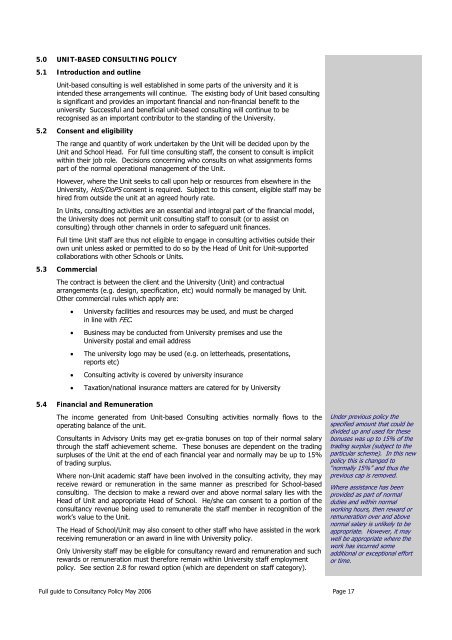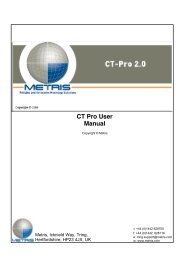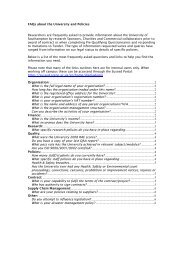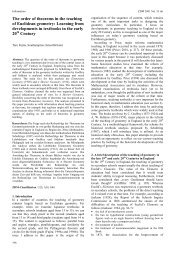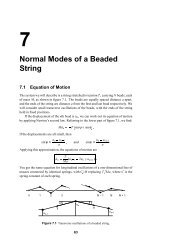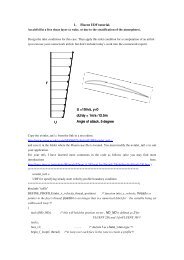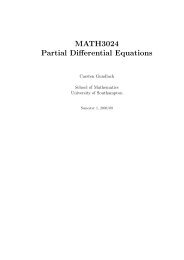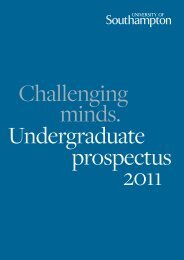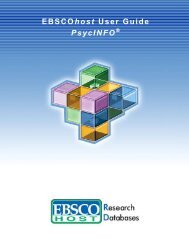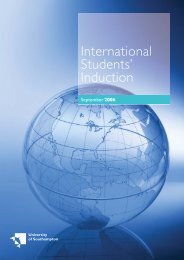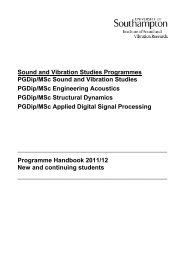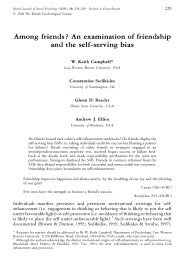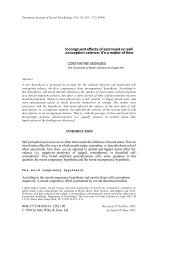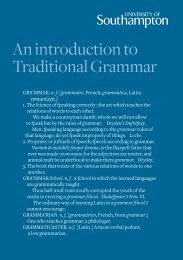Full guide to Consultancy Policy May 2006 Page 1 - University of ...
Full guide to Consultancy Policy May 2006 Page 1 - University of ...
Full guide to Consultancy Policy May 2006 Page 1 - University of ...
Create successful ePaper yourself
Turn your PDF publications into a flip-book with our unique Google optimized e-Paper software.
5.0 UNIT-BASED CONSULTING POLICY<br />
5.1 Introduction and outline<br />
Unit-based consulting is well established in some parts <strong>of</strong> the university and it is<br />
intended these arrangements will continue. The existing body <strong>of</strong> Unit based consulting<br />
is significant and provides an important financial and non-financial benefit <strong>to</strong> the<br />
university Successful and beneficial unit-based consulting will continue <strong>to</strong> be<br />
recognised as an important contribu<strong>to</strong>r <strong>to</strong> the standing <strong>of</strong> the <strong>University</strong>.<br />
5.2 Consent and eligibility<br />
The range and quantity <strong>of</strong> work undertaken by the Unit will be decided upon by the<br />
Unit and School Head. For full time consulting staff, the consent <strong>to</strong> consult is implicit<br />
within their job role. Decisions concerning who consults on what assignments forms<br />
part <strong>of</strong> the normal operational management <strong>of</strong> the Unit.<br />
However, where the Unit seeks <strong>to</strong> call upon help or resources from elsewhere in the<br />
<strong>University</strong>, HoS/<br />
DoPS consent is required. Subject <strong>to</strong> this consent, eligible staff may be<br />
hired from outside the unit at an agreed hourly rate.<br />
In Units, consulting activities are an essential and integral part <strong>of</strong> the financial model,<br />
the <strong>University</strong> does not permit unit consulting staff <strong>to</strong> consult (or <strong>to</strong> assist on<br />
consulting) through other channels in order <strong>to</strong> safeguard unit finances.<br />
<strong>Full</strong> time Unit staff are thus not eligible <strong>to</strong> engage in consulting activities outside their<br />
own unit unless asked or permitted <strong>to</strong> do so by the Head <strong>of</strong> Unit for Unit-supported<br />
collaborations with other Schools or Units.<br />
5.3 Commercial<br />
The contract is between the client and the <strong>University</strong> (Unit) and contractual<br />
arrangements (e.g. design, specification, etc) would normally be managed by Unit.<br />
Other commercial rules which apply are:<br />
• <strong>University</strong> facilities and resources may be used, and must be charged<br />
in line with FEC.<br />
• Business may be conducted from <strong>University</strong> premises and use the<br />
<strong>University</strong> postal and email address<br />
• The university logo may be used (e.g. on letterheads, presentations,<br />
reports etc)<br />
• Consulting activity is covered by university insurance<br />
• Taxation/national insurance matters are catered for by <strong>University</strong><br />
5.4 Financial and Remuneration<br />
The income generated from Unit-based Consulting activities normally flows <strong>to</strong> the<br />
operating balance <strong>of</strong> the unit.<br />
Consultants in Advisory Units may get ex-gratia bonuses on <strong>to</strong>p <strong>of</strong> their normal salary<br />
through the staff achievement scheme. These bonuses are dependent on the trading<br />
surpluses <strong>of</strong> the Unit at the end <strong>of</strong> each financial year and normally may be up <strong>to</strong> 15%<br />
<strong>of</strong> trading surplus.<br />
Where non-Unit academic staff have been involved in the consulting activity, they may<br />
receive reward or remuneration in the same manner as prescribed for School-based<br />
consulting. The decision <strong>to</strong> make a reward over and above normal salary lies with the<br />
Head <strong>of</strong> Unit and appropriate Head <strong>of</strong> School. He/she can consent <strong>to</strong> a portion <strong>of</strong> the<br />
consultancy revenue being used <strong>to</strong> remunerate the staff member in recognition <strong>of</strong> the<br />
work’s value <strong>to</strong> the Unit.<br />
The Head <strong>of</strong> School/Unit may also consent <strong>to</strong> other staff who have assisted in the work<br />
receiving remuneration or an award in line with <strong>University</strong> policy.<br />
Only <strong>University</strong> staff may be eligible for consultancy reward and remuneration and such<br />
rewards or remuneration must therefore remain within <strong>University</strong> staff employment<br />
policy. See section 2.8 for reward option (which are dependent on staff category).<br />
Under previous policy the<br />
specified amount that could be<br />
divided up and used for these<br />
bonuses was up <strong>to</strong> 15% <strong>of</strong> the<br />
trading surplus (subject <strong>to</strong> the<br />
particular scheme). In this new<br />
policy this is changed <strong>to</strong><br />
“normally 15%” and thus the<br />
previous cap is removed.<br />
Where assistance has been<br />
provided as part o f normal<br />
duties and within normal<br />
working hours, then reward or<br />
remuneration over and above<br />
normal salary is unlikely <strong>to</strong> be<br />
appropriate. However, it may<br />
well be appropriate where the<br />
work has incurred some<br />
additional o r exceptional effort<br />
or time.<br />
<strong>Full</strong> <strong>guide</strong> <strong>to</strong> <strong>Consultancy</strong> <strong>Policy</strong> <strong>May</strong> <strong>2006</strong> <strong>Page</strong> 17


